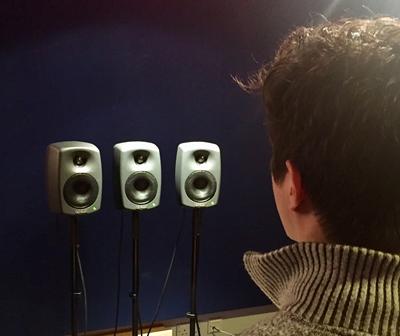Research project: Theoretical Advances in Multichannel Crosstalk Cancellation Systems
Development of new theoretical and practical knowledge of multichannel crosstalk cancellation systems.
Development of new theoretical and practical knowledge of multichannel crosstalk cancellation systems.

A popular and practical approach to 3D audio is the binaural audio format. Binaural audio is a two-channel format that encodes the spatial information needed for the perception of the full spatial nature of sounds around us. The primary caveat to binaural audio is that the two channels must be reproduced without interference at the ears of a listener. As such, headphones are typically used to deliver binaural audio as the two channels do not mix in the surrounding air.
However, wearing headphones may not always be desirable or practical. In some cases, the use of loudspeakers is preferred. Fortunately, binaural audio can be reproduced with great accuracy with loudspeakers, albeit under certain provisions, using the theory of crosstalk cancellation (CTC).
Today, the use of multichannel CTC systems has grown to a considerable maturity, both in theory and application. Yet, a disparity between the experimental progress and theoretical understanding in the field of multichannel CTC was identified at the start of the project and thus became the focal point of subsequent exploration.
The project has culminated in VAAE researcher Eric Hamdan's Ph.D. thesis titled, "Theoretical Advances in Multichannel Crosstalk Cancellation Systems", which was supervised by Prof. Filippo Maria Fazi and Dr. Keith Holland, and successfully defended in November 2020. The thesis consists of four interconnected works that further the current state of the art in multichannel CTC theory, the first of which has been published recently in a leading acoustics journal. Another portion of the thesis, that establishes the physical conditions for optimally conditioned systems, has been published as an open access preprint and is currently under journal review.